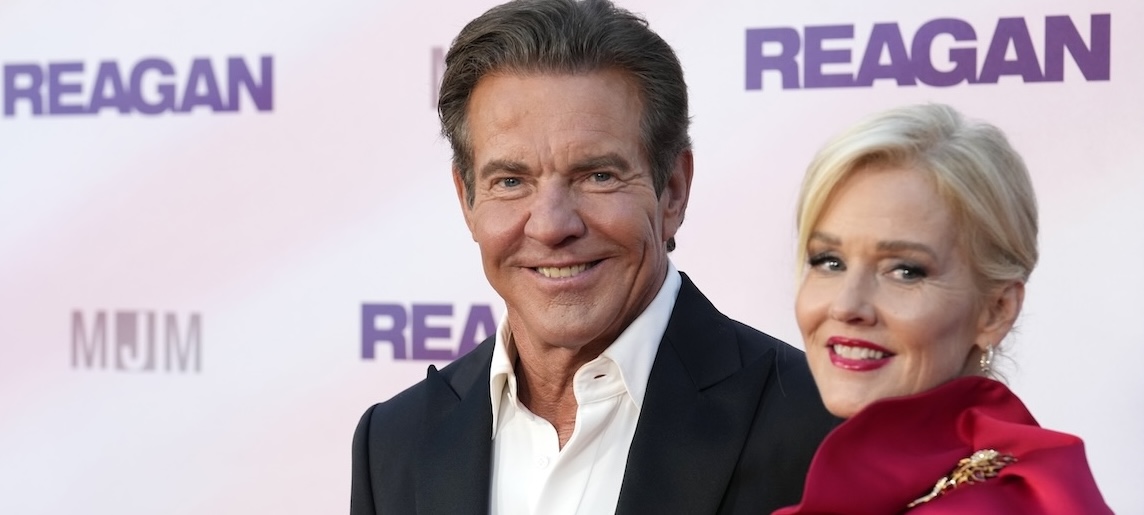There’s never been a major Reagan movie until 2024. Yet there’s a need for such storytelling. The most important president of the 20th century after FDR is in danger of being forgotten with the change of generations, of political conflicts, and even of technology. Reagan was also the last president to become remarkably, lastingly popular and achieve major political victories, such that he is the standard against which to measure his successors.
Reagan (2024) had therefore the chance to be a memorable movie, to perform the most important function our art can perform, to improve the national memory. But even making such a movie is breaking a kind of Hollywood taboo, since cultural elites hated Reagan with a passion, possibly more than Nixon, since Reagan was the more successful. And the movie does have the remarkable advantage of starring Dennis Quaid as Reagan and Penelope Ann Miller as Nancy, both of whom are solid in roles that are very difficult to persuade an audience to accept. Reagan was seen and heard by so many for so long on radio and TV that it’s hard to accept fictional substitutes.
Reagan was a great president, but Reagan isn’t a great movie. It’s enjoyable, because it allows us to see Reagan’s life all over again, from childhood to retirement. But it attempts to tell his story from the point of view of a Russian KGB agent (played by Jon Voight) who had followed his career, and here the plot gets into trouble. It would have required a great writer to understand why civilized people would even consider the point of view of a murderous tyranny, but it is true that we do need somehow to understand our enemies. Reagan, however, cannot offer any idea about what made the Soviets redoubtable enemies, much less what humanity looks like beyond American borders.
Reagan is intended as a vindication of a man whose greatness has been denied by his political adversaries, whom he defeated in several elections, but who have proved the victors in perhaps a more important sense. The use of the fictional Soviet agent admitting that Reagan did win the Cold War is best understood as a swipe at those liberals who, like TIME in January 1990, declared Gorbachev the man of the decade. But the movie takes for granted both Reagan’s victory and the audience’s remembering it. Thus, it can only succeed with retirees. Younger audiences are not aware of the conflicts of the 1980s, much less of Reagan’s career previous to the presidency.
The core of Reagan is anticommunism, the uniting of political commitment and activity in Reagan’s life from his days in the Screen Actor’s Guild to the fall of the Berlin Wall. The movie gets across this lifelong conviction and Reagan’s place in politics, but fails to convey the danger of communism, either foreign or domestic. The sequence of the movie suggests an argument that would add up to an attack on liberal elites in culture as slaves of ideology: communists in Hollywood in the 1940s, then hippies in the late 1960s—and they should have added the media in the 1980s. But Reagan doesn’t take this route, and thus misses the most important opportunity that comes out of its plot, to explain Reagan’s domestic opposition.
This failure follows from the decision to replace Reagan’s politics with his rhetoric, and with the sunniest aspects of his rhetoric at that. We get a movie that softens both America and Reagan. That somehow corresponds to our desire to remember the good things, but it makes political conflict unintelligible. In a few bad moments, the movie suggests that Reagan’s showmanship saved America. But in fact it was arms and wealth and the willingness to use both. An audience persuaded by such an idealized vision would paradoxically be led to despair over our own situation, since they’d expect easy victories instead of the conflicts in the midst of which Reagan thrived.
As with America, so with Reagan. We get a man who was raised by a strong mother to be a good evangelical Christian, as well as to be tough; his father was an alcoholic, but the boy grew up unaffected, a strong, healthy lifeguard. The Great Depression doesn’t figure into the story, instead we cut to Hollywood. Neither in his upbringing, which is emphasized for our benefit as formative, nor in his professional activity do we ever come to understand Reagan. He’s presented as one of us, and perhaps better than most of us, but not as what he was, that rarest of things in America: a very successful president.
The movie does much better in showing Reagan’s romance with Nancy, which gave him the life he needed to be a politician. They meet cute in the context of anticommunism, but she quickly turns out to have a certain depth and to become his most loyal confidante. This, of course, creates a difficulty for the story, because one expects that Reagan talked to his wife about things he had to hide not just from voters but from his own cabinet, yet these things have wisely been concealed by that remarkable woman.
One final mistake is the sentimental conclusion: Reagan’s public statement about Alzheimer’s and his last horseback ride. A great movie would have ended with Reagan’s Farewell Address, a remarkable speech that deserves renewed attention, not least because it reminds us that Reagan was serious, realistic about achievements and failures, and prescient about the failure of patriotism, the political crisis in which we now find ourselves, the “culture war.”
The movie does something to show Reagan’s faith as well, from his boyhood choice to be baptized to his struggling to understand his destiny and find the confidence to act on the belief in providence, to his prayers with his friend Pat Boone and a pastor, played in the movie by Boone, in 1970. There is something in the movie that suggests Reagan was almost destined, but it would have taken a great director to achieve that. I thought of John Ford’s Young Lincoln.
One would have wanted to know more, since faith played in Reagan’s life the role that Progress played in the life of his adversaries, and it was disagreement in this regard that caused the endless hysteria of the 1980s. The strangest misinterpretation of Reagan that liberals indulged was that he was a warmonger, and the movie does well to dispel that. But in this regard, too, his ideological adversaries have advanced a position of remarkable hostility toward Christianity, and it is less obvious nowadays that a Christian leader could prove as popular and unifying as Reagan was. We need to understand why. Unfortunately, Reagan is little help there.

